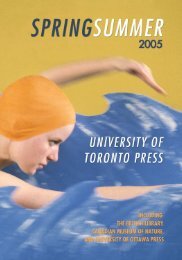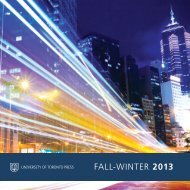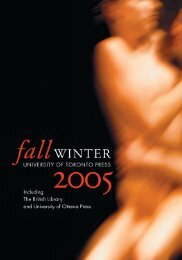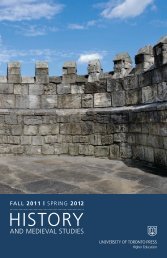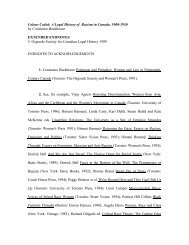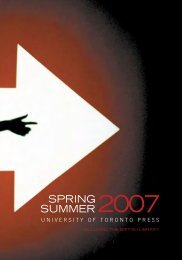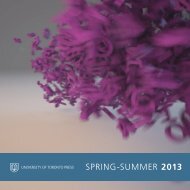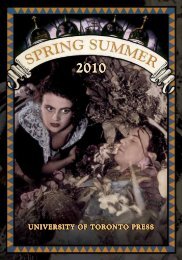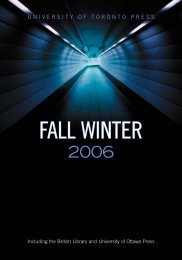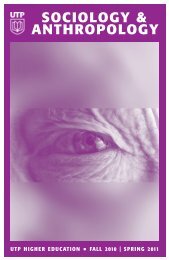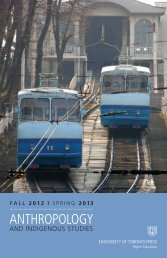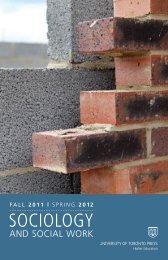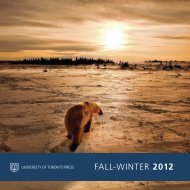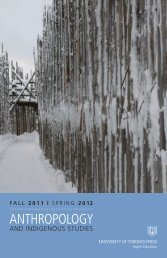Classics, Medieval & Renaissance 2012 - University of Toronto ...
Classics, Medieval & Renaissance 2012 - University of Toronto ...
Classics, Medieval & Renaissance 2012 - University of Toronto ...
Create successful ePaper yourself
Turn your PDF publications into a flip-book with our unique Google optimized e-Paper software.
LITERATURE<br />
Forgetful Muses<br />
Reading the Author in the Text<br />
Ian Lancashire<br />
With research featured in The New York Times<br />
Magazine’s Ninth Annual Year in Ideas<br />
How can we understand and analyse the primarily<br />
unconscious process <strong>of</strong> writing In this groundbreaking<br />
work <strong>of</strong> neuro-cognitive literary theory,<br />
Ian Lancashire maps the interplay <strong>of</strong> self-conscious<br />
critique and unconscious creativity.<br />
Drawing on author testimony, cybernetics, cognitive<br />
psychology, corpus linguistics, text analysis, the<br />
neurobiology <strong>of</strong> mental aging, and his own experiences,<br />
Lancashire’s close readings <strong>of</strong> twelve authors, including<br />
Caedmon, Chaucer, Coleridge, Joyce, Christie, and<br />
Atwood, serve to illuminate a mystery we all share.<br />
Ian Lancashire is a pr<strong>of</strong>essor in the Department <strong>of</strong><br />
English at the <strong>University</strong> <strong>of</strong> <strong>Toronto</strong>.<br />
‘Forgetful Muses is filled with a wealth <strong>of</strong> materials<br />
and exhibits an impressively high standard <strong>of</strong> scholarship<br />
– it’s a demanding read, but also highly rewarding.’<br />
Raine Koskimaa, <strong>University</strong> <strong>of</strong> Jyväskylä<br />
360 pp / 18 illustrations; 24 tables / 6 x 9 / 2010<br />
Cloth 978-1-4426-4093-1 $65.00 (£45.99)<br />
SPANISH<br />
NEW<br />
Objects <strong>of</strong> Culture<br />
in the Literature <strong>of</strong> Imperial Spain<br />
<br />
NEW<br />
edited by<br />
Mary E. Barnard and Frederick A. de Armas<br />
Objects <strong>of</strong> Culture in the Literature<br />
<strong>of</strong> Imperial Spain<br />
Edited by Mary E. Barnard and Frederick A. de Armas<br />
Collecting and displaying finely crafted objects was<br />
a mark <strong>of</strong> character among the royals and aristocrats<br />
in Early Modern Spain: it ranked with extravagant<br />
hospitality as a sign <strong>of</strong> nobility and with virtue as a<br />
token <strong>of</strong> princely power. Objects <strong>of</strong> Culture in the<br />
Literature <strong>of</strong> Imperial Spain explores how the writers<br />
<strong>of</strong> the period shared the same impulse to collect,<br />
arrange, and display objects, though in imagined<br />
settings, as literary artefacts.<br />
These essays examine a variety <strong>of</strong> cultural objects<br />
described or alluded to in books from the Golden<br />
Age <strong>of</strong> Spanish literature, including clothing, paintings,<br />
tapestries, playing cards, monuments, materials <strong>of</strong><br />
war, and even enchanted bronze heads. The contributors<br />
emphasize how literature preserved and transformed<br />
objects to endow them with new meaning<br />
for aesthetic, social, religious, and political purposes<br />
– whether to perpetuate certain habits <strong>of</strong> thought<br />
and belief, or to challenge accepted social and moral<br />
norms.<br />
Mary E. Barnard is associate pr<strong>of</strong>essor <strong>of</strong> Spanish<br />
and Comparative Literature at The Pennsylvania<br />
State <strong>University</strong>. Frederick A. de Armas is the Andrew<br />
W. Mellon Distinguished Service Pr<strong>of</strong>essor in the<br />
Humanities, Spanish Literature, and Comparative<br />
Literature at the <strong>University</strong> <strong>of</strong> Chicago.<br />
(<strong>Toronto</strong> Iberic)<br />
Approx. 336 pp / 14 illustrations / 6 x 9 / December <strong>2012</strong><br />
Cloth 978-1-4426-4512-7 $75.00 (£52.99)<br />
Law and History in Cervantes’ Don Quixote<br />
Susan Byrne<br />
Law and History in Cervantes’ Don Quixote is a deep<br />
consideration <strong>of</strong> the intellectual environment that<br />
gave rise to Cervantes’ seminal work. Susan Byrne<br />
demonstrates how Cervantes synthesized the debates<br />
surrounding the two most authoritative discourses<br />
<strong>of</strong> his era – those <strong>of</strong> law and history – into a new<br />
aesthetic product, the modern novel.<br />
Byrne uncovers the empirical underpinnings <strong>of</strong><br />
Don Quixote through a close philological study <strong>of</strong><br />
Cervantes’ sly questioning <strong>of</strong> and commentary on<br />
these fields. As she skilfully demonstrates, while<br />
sixteenth-century historiographers and jurists across<br />
southern Europe sought the philosophical nexus <strong>of</strong><br />
their fields, Cervantes created one through the<br />
adventures <strong>of</strong> a protagonist whose history is all about<br />
justice. As such, Law and History in Cervantes’ Don<br />
Quixote illustrates how Cervantes’ art highlighted<br />
the inconsistencies <strong>of</strong> juridical-historical texts and<br />
practice, as well as anticipated the ultimate resolution<br />
<strong>of</strong> their paradoxes.<br />
Susan Byrne is an assistant pr<strong>of</strong>essor in the Department<br />
<strong>of</strong> Spanish and Portuguese at Yale <strong>University</strong>.<br />
(<strong>Toronto</strong> Iberic)<br />
Approx. 248 pp / 8 illustrations / 6 x 9 / October <strong>2012</strong><br />
Cloth 978-1-4426-4527-1 $55.00 (£38.99)<br />
28 <strong>University</strong> <strong>of</strong> <strong>Toronto</strong> Press



